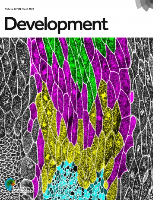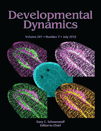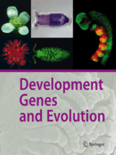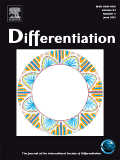
DEVELOPMENT
Scope & Guideline
Fostering a deeper understanding of life’s developmental mechanisms.
Introduction
Aims and Scopes
- Multicellular Development and Differentiation:
Investigating the molecular and cellular mechanisms underlying the organization and differentiation of cells within multicellular organisms, including studies on stem cells, tissue formation, and organogenesis. - Model Organisms and Comparative Developmental Biology:
Utilizing model organisms, such as zebrafish, Drosophila, and various plant species, to elucidate developmental processes and evolutionary conservation across species. - Regenerative Biology:
Exploring the mechanisms of regeneration in different organisms, focusing on how cells respond to injury and the potential for tissue repair and regeneration. - Gene Regulation and Signaling Pathways:
Examining the role of specific genes and signaling pathways, such as Wnt, Hedgehog, and Notch, in controlling developmental processes, including cell fate determination and tissue patterning. - Environmental and Physiological Influences on Development:
Studying how environmental factors, such as mechanical forces and nutrient availability, affect developmental trajectories and cellular behaviors. - Technological Innovations in Developmental Biology:
Developing and applying advanced imaging, genetic, and computational techniques to study developmental processes at single-cell resolution and in real-time.
Trending and Emerging
- Single-Cell Transcriptomics and Proteomics:
There is a growing emphasis on single-cell analysis techniques, allowing researchers to dissect cellular heterogeneity in development and understand lineage tracing at unprecedented resolution. - Regenerative Medicine and Stem Cell Biology:
Research focusing on the mechanisms of regeneration and the potential of stem cells in therapeutic applications is on the rise, highlighting the translational aspects of developmental biology. - Intercellular Communication and Extracellular Matrix Dynamics:
Studies exploring how cells communicate and interact with the extracellular matrix to influence development are increasingly prevalent, reflecting a deeper understanding of the tissue microenvironment. - Applications of Machine Learning and Computational Biology:
The incorporation of machine learning and computational methods in analyzing developmental processes and large datasets is emerging as a crucial trend, facilitating new insights and predictive modeling. - Environmental Influences on Development:
Research investigating how environmental factors, including mechanical forces and nutrient availability, impact developmental processes is becoming more prominent, emphasizing the interplay between biology and the environment.
Declining or Waning
- Traditional Morphology and Histology:
There has been a noticeable decrease in publications centered solely on classical morphological studies and histological techniques, as the field increasingly embraces molecular and genetic approaches. - Descriptive Developmental Studies:
Research that primarily describes developmental processes without integrating molecular or genetic analyses seems to be less frequent, as the emphasis shifts towards mechanistic understanding. - Single-Organ Studies:
Investigations focused exclusively on the development of single organs without considering systemic interactions or regenerative potential are becoming less common in favor of more holistic approaches. - Static Imaging Techniques:
The reliance on traditional static imaging techniques has declined, with a preference for dynamic, real-time imaging methods that provide insights into developmental processes as they unfold. - In Vitro Models without In Vivo Correlation:
Research utilizing in vitro models that do not correlate with in vivo systems is seeing reduced interest, as the field emphasizes the importance of studying development in a more physiological context.
Similar Journals

Molecular Cell
Elevating Scientific Standards in Molecular and Cell Research.Molecular Cell, published by Cell Press, is a leading journal in the fields of cell biology and molecular biology. Established in 1997, this prestigious journal boasts a significant impact within the scientific community, evidenced by its impressive 2023 Scopus rankings, placing it in the top 2% of its field (Rank #10/410 in Molecular Biology, Rank #12/285 in Cell Biology). With a focus on cutting-edge research that bridges the gap between molecular genetics and cellular function, Molecular Cell serves as an essential platform for the dissemination of vital findings and innovative methodologies. Although it follows a traditional publishing model without Open Access options, its rigorous peer-review process and high standards ensure that articles published within these pages are of the utmost quality, making it an invaluable resource for researchers, professionals, and students alike seeking to stay at the forefront of scientific discovery. The journal's address is 50 Hampshire St, Floor 5, Cambridge, MA 02139, United States, reinforcing its commitment to fostering scientific excellence and collaboration.

EMBO REPORTS
Unveiling Insights in Biochemistry, Genetics, and BeyondEMBO REPORTS, published by WILEY, is a premier journal in the fields of Biochemistry, Genetics, and Molecular Biology, recognized for its rigorous peer-review process and impactful scientific contributions. Established in the year 2000 in the United Kingdom, this journal has maintained a stellar reputation, reflected in its consistent positioning within the Q1 category across these disciplines as of 2023. EMBO REPORTS excels in disseminating high-quality and timely research that addresses fundamental questions and challenges in molecular biology and genetics, making it an invaluable resource for researchers, professionals, and students. With impressive Scopus rankings, including Genetics at the 32nd rank and a 90th percentile placement, it fosters an environment for scholarly exchange and advances in knowledge. While Open Access options are not available, the journal continues to enhance its impact through traditional subscription models, thereby maintaining wide visibility in the scientific community. Its ongoing evolution promises continued relevance and influence until at least 2024.

DEVELOPMENTAL DYNAMICS
Illuminating the Pathways of Biological DevelopmentDEVELOPMENTAL DYNAMICS is a prominent journal in the field of Developmental Biology, published by WILEY. This esteemed journal, identifiable by its ISSN 1058-8388 and E-ISSN 1097-0177, provides a critical platform for the dissemination of innovative research covering cellular and developmental processes across diverse biological systems. With a 2023 impact factor placing it in the Q2 category of Developmental Biology and an impressive Scopus rank of #39/82, the journal plays a vital role in advancing knowledge and fostering collaboration among researchers, professionals, and students. Although it is not an open-access publication, DEVELOPMENTAL DYNAMICS remains a cornerstone in the academic community, particularly for those dedicated to understanding the complexities of biological development. The journal's convergence from 1992 to 2024 reflects its longstanding commitment to high-impact research that influences both theoretical and practical applications in the field.

DEVELOPMENT GROWTH & DIFFERENTIATION
Connecting Research and Discovery in Developmental ScienceDEVELOPMENT GROWTH & DIFFERENTIATION, published by Wiley, stands as a vital journal in the realms of Cell Biology, Developmental Biology, and Medicine. With an ISSN of 0012-1592 and E-ISSN of 1440-169X, this esteemed journal has been a key player in the scientific community since its inception in 1969, continuing to contribute significantly to the understanding of developmental processes and mechanisms underlying growth and differentiation. Ranked Q3 in Cell Biology and Developmental Biology, and Q2 in miscellaneous aspects of Medicine as of 2023, the journal provides a platform for high-quality research articles, reviews, and critical insights that foster academic discourse in these vital fields. Although currently not available as open access, the journal ensures the availability of essential research to its global readership, facilitating collaboration and innovation. Researchers, professionals, and students alike will find DEVELOPMENT GROWTH & DIFFERENTIATION to be an invaluable resource for advancing knowledge and driving forward the scientific inquiry into the intricacies of biological development.

DEVELOPMENT GENES AND EVOLUTION
Pioneering Research at the Intersection of Genes and Development.DEVELOPMENT GENES AND EVOLUTION is a prominent academic journal published by Springer, dedicated to advancing the fields of developmental biology and genetics. With an ISSN of 0949-944X and an E-ISSN of 1432-041X, this journal plays a crucial role in disseminating high-quality research that explores the genetic underpinnings of developmental processes across various organisms. Located in the United States, the journal has maintained a strong international presence with a significant impact factor, reflecting its importance in the scientific community. It currently holds a Q3 ranking in both developmental biology and genetics, according to the latest 2023 category quartiles, indicating a solid standing among peers. With a convergence of insights from 1996 to 2024, the journal publishes original articles, reviews, and research notes that attract a diverse readership of researchers, professionals, and students. Access options include traditional subscription models and open access, ensuring that vital research is available to a broad audience. By fostering discussions on the evolution of developmental mechanisms, DEVELOPMENT GENES AND EVOLUTION continues to be an essential resource for those interested in understanding the intricate interplay between genetics and development.

DIFFERENTIATION
Exploring the Complexities of Life's Building BlocksDIFFERENTIATION is a respected peer-reviewed journal published by Elsevier Science Ltd, dedicated to advancing knowledge in the fields of Cancer Research, Cell Biology, Developmental Biology, and Molecular Biology. With an established history since 1973, the journal continuously explores the intricacies of cellular and molecular processes that govern differentiation in biological systems, thus playing a pivotal role in shaping contemporary research directions. Currently indexed in the Q3 quartile across multiple relevant categories, it provides a crucial platform for researchers to disseminate their findings and engage with the scientific community. DIFFERENTIATION does not offer open access, but it remains a valuable resource for academics seeking to enhance their understanding of the fundamental mechanisms that underpin life sciences. By fostering a rigorous dialogue among scientists, it contributes significantly to the ever-evolving landscape of biochemistry and genetics.

TISSUE & CELL
Innovating Insights into Developmental BiologyTISSUE & CELL is a prominent academic journal, published by CHURCHILL LIVINGSTONE, that has been at the forefront of research in the fields of cell biology, developmental biology, and miscellaneous areas of medicine since its inception in 1969. With a strong focus on high-quality research, TISSUE & CELL has established itself within the academic community, holding a Q3 ranking in both Cell Biology and Developmental Biology, and a Q2 ranking in Medicine as of 2023. The journal aims to disseminate significant findings that contribute to the understanding of tissue structure and function, helping to bridge the gap between basic biological research and clinical applications. While it operates on a subscription basis and does not currently offer Open Access options, the journal remains a vital resource for researchers, professionals, and students interested in cutting-edge developments in the biological sciences. The journal's address is located in the scenic city of Edinburgh, further establishing its academic heritage in the United Kingdom.

DNA AND CELL BIOLOGY
Fostering Innovation in Biological ResearchDNA AND CELL BIOLOGY, published by Mary Ann Liebert, Inc, is a distinguished journal in the realms of cell biology, genetics, and molecular biology, holding a notable position in its Q3 and Q2 quartile rankings across multiple academic categories as of 2023. With an ISSN of 1044-5498 and an E-ISSN of 1557-7430, this journal has been a pivotal platform for the dissemination of cutting-edge research since its inception in 1990, extending its coverage through 2024. Situated in the United States, the journal offers high-quality peer-reviewed articles, exploring significant advancements in biological sciences while fostering interdisciplinary collaborations within the research community. Though it currently does not offer open access, subscribed institutions and individual readers benefit from its rich repository of knowledge. The journal's rigorous standards and impactful content make it an essential resource for researchers, professionals, and students alike, aiming to stay at the forefront of discoveries influencing DNA and cellular dynamics.

DEVELOPMENTAL BIOLOGY
Exploring Cellular Journeys in DevelopmentDEVELOPMENTAL BIOLOGY, published by Academic Press Inc., Elsevier Science, stands as a pivotal journal in the fields of cell biology, developmental biology, and molecular biology since its inception in 1959. Renowned for its rigorous peer-review process, this journal serves as a platform for publishing cutting-edge research, reviews, and insights that drive forward our understanding of developmental processes at the cellular and molecular levels. With an impressive track record, it is classified in the Q2 quartile across multiple categories, reflecting its significant impact and relevance in academia and research communities. Although the journal does not provide Open Access options, it remains accessible via numerous academic databases, ensuring a wide reach for researchers, professionals, and students alike. With a commitment to advancing the field, DEVELOPMENTAL BIOLOGY continues to be essential reading for those looking to stay at the forefront of developmental research and its applications.

Russian Journal of Developmental Biology
Illuminating the pathways of biological growth.The Russian Journal of Developmental Biology, published by PLEIADES PUBLISHING INC, serves as a significant platform for researchers and professionals engaged in the field of developmental biology. With the ISSN 1062-3604 and E-ISSN 1608-3326, this journal focused on intricate biological processes and dynamic developmental mechanisms from 2005 until 2017. Although its coverage is currently discontinued in Scopus, it remains notable for its contribution to understanding the pivotal roles of biochemistry and molecular genetics within the context of development. As a publication situated in the competitive quartiles of the field and boasting an influential Scopus rank of #77 out of #78, it has made a unique mark in developmental studies. Researchers and academics seeking to enhance their knowledge of historical advancements in the discipline will find the journal a valuable resource, even as it navigates the transition away from active publication.